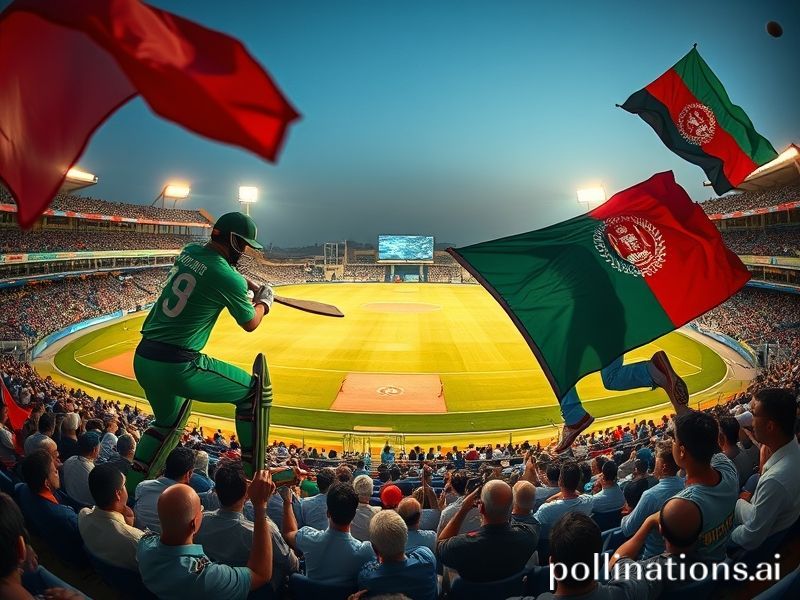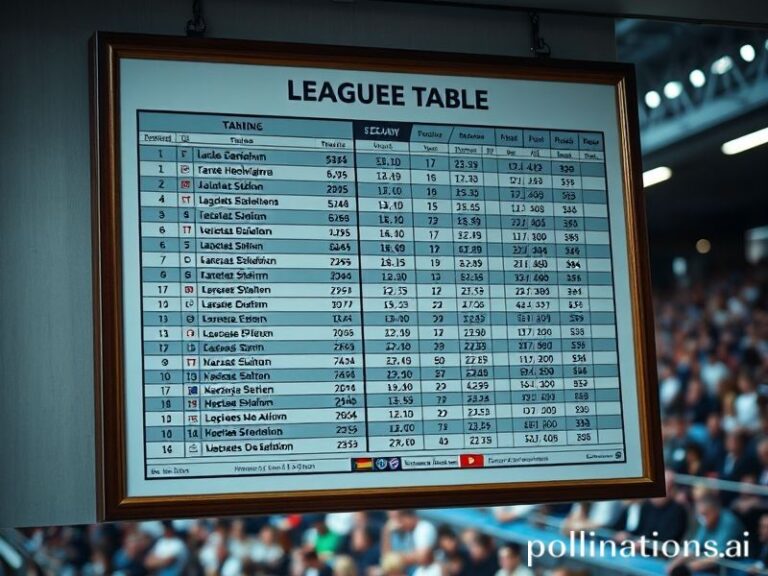Pak vs Afg: When Cricket Becomes a Geopolitical Time Bomb with a Tea Break
# The Cricket Match That Wasn’t: How a Ball Game Became a Geopolitical Theater
The ICC Cricket World Cup fixture between Pakistan and Afghanistan at Chennai’s M.A. Chidambaram Stadium was meant to be a straightforward group-stage contest—twenty-two athletes, two innings, one winner. Instead it delivered a master-class in how the 21st century manages to weaponize even the most genteel colonial pastime. By the time the last Afghan wicket fell, the scoreboard read Pakistan 286, Afghanistan 286, and Global Anxiety incalculable.
Anyone puzzled that a sport involving padded men politely appealing for LBW could rattle capitals from Washington to Beijing clearly hasn’t been paying attention. Cricket has always been more than bat and ball; it’s the British Empire’s longest-running reality show, now franchised across former colonies who discovered that beating the old master at his own game is cheaper than a revolution. When Pakistan and Afghanistan meet, though, the subtext is less “quaint sporting ritual” and more “regional proxy war with a tea break.”
## Flags, Fisticuffs, and Foreign Policy
Inside the stadium, traveling Pakistani fans waved national flags alongside, curiously, posters of the Taliban’s Islamic Emirate banner—an accidental Photoshop of allegiances that would give any security analyst hives. Outside, scuffles erupted between supporters, social media clips circulated faster than dengue, and Chennai police earned overtime breaking up theological debates thinly disguised as crowd-control problems. Nothing says “spirit of the game” quite like riot gear outside a cricket ground.
The broader audience—billion-dollar broadcast contracts, diaspora WhatsApp groups, and betting syndicates from Lahore to London—watched a match morph into a geopolitical Rorschach test. For Islamabad, a victory would soothe a nation currently flirting with sovereign default and provide the civilian government a rare 24-hour respite from being blamed for everything from inflation to the weather. For Kabul’s Taliban regime, still starved of international recognition, a win would furnish the kind of soft-power legitimacy the UN stubbornly refuses to hand over. In other words, both teams were carrying external debt and existential angst in their kit bags.
## The Belt, the Road, and the Cover Drive
China, ever alert to opportunities that don’t involve transparency, reportedly eyed the encounter as a potential data point for its “Belt and Road” soft-power index, while Indian commentators toggled between schadenfreude and genuine concern that a Taliban-branded celebration might spill across the Wagah border. Meanwhile Washington’s think-tankers, who can locate T20 symbolism in a NATO breakfast, issued earnest papers titled “Cricket as Counter-Insurgency: Lessons from Chennai.” The Pentagon’s next drone will probably be delivered with complimentary match tickets.
The game itself delivered the melodrama required by such stakes: Afghanistan, once the Associate-team darling, posted 282—an Everest for a side whose home fixtures are staged in safer countries than their own. Pakistan’s chase wobbled like their rupee until the ever-green Mohammad Rizwan played diplomat, crafting an unbeaten century that negotiated victory with only marginally less difficulty than an IMF delegation. Cue fireworks, tears, and Afghan players slumped like they’d just discovered another visa rejection.
## The Takeaway (for those still pretending sport is separate from life)
The final whistle changed exactly nothing on the ground: Kabul’s banks stayed empty, Islamabad’s petrol queues lengthened, and the world spun on its intractable axis. Yet for eight hours, a stadium in South India hosted a controlled experiment in what happens when history, hope, and a white leather ball collide. Spectators were reminded—if another reminder was needed—that national identity is mostly a costume we don for tribal skirmishes, be they military, economic, or, most absurdly, athletic.
Cricket’s genius is its ability to convince participants that the stakes are life-and-death while simultaneously proving they are anything but. The tragedy, of course, is that elsewhere in the region, life-and-death decisions are made daily with far less scrutiny than a questionable LBW call. So Pakistan advances to the next round; Afghanistan exits, dignity bruised but intact. And somewhere a UN peacekeeping convoy drives past a makeshift pitch where kids bat with plywood, unaware that their innocent game is already mortgaged to tomorrow’s headlines.







